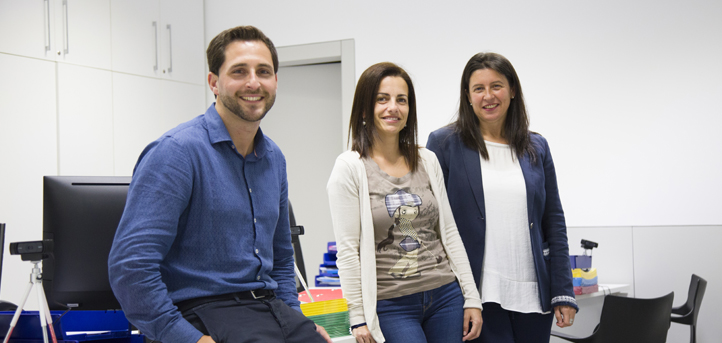- Under such an exceptional situation, most of the questions are related to adapting the model to the educational context, its manner of implementation, and the exam dates.
- In recent years we have developed tools in our system that, if necessary, would enable adapting a non-attendance enrollment scenario for the next academic year.
During these last weeks, when our way of life has changed as has our students’ education, the Academic Secretary’s Department of the European University of the Atlantic, staffed by Lourdes Vaquero, Eva Salcines, and Carlos Acero, has never stopped working. They are making great efforts in answering all the questions from the students and their families during this new and unusual situation.
Lourdes Vaquero, the head of the University’s Academic Secretary, shares with us how she is living through these moments of uncertainty and remote work.
What is your main task or responsibility during the current situation?
The University’s Academic Secretary’s Office is a guidepost for students at both the academic and administrative levels, and our first objective was to try and ensure that we maintained this service, even if not face-to-face.
To this end, with the necessary adaptations and by overcoming the initial problems, we tried to maintain our support in answering all questions that arrived by email, telephone, etc., from the students and their families.
We have continued to carry out our work on a regular basis, such as creating all types of certificates, qualifications, or university enrollments, as well as other tasks on reviewing and updating existing documentation and data located in the management system, which is specific to internal and interdepartmental functions. As is typical of this situation, we have also tried to provide support by providing information on the subjects’ transformation processes into the distance model, notifying the starting periods and subjects affected by each degree and program.
Lastly, preparations have begun for the 2020/2021 academic year’s enrollment process to ensure that classes may begin under the conditions set by the authorities, although this is a difficult task to foresee.
What are the most frequent questions that the department receives?
Questions have varied according to each period as the conditions that we all face continuously change. Once the institution made the academic itinerary known through its channels of communication, concerns were addressed on how the university would adapt its model to the educational context, how the subjects would be taught, and the dates for the final exams.
They specifically focused on migrating the subjects into the virtual environment, especially those with high practical content; knowing the communication channels to contact those responsible for academic affairs and payment plans, or the date and manner of taking the final exams.
From the Secretary’s Office, the Virtual Campus was aimed at knowing the activities, teaching, recordings, and/or activities arranged by each professor according to the subject matter, as well as being a tool for direct contact with the heads of academic affairs to answer any concerns. The university has taken this decision because it is the best system to ensure the correct evaluation of skills and content, but which would always be adapted to the conditions set by the health and academic authorities.
Do you think that after this exceptional situation is over, some of the lessons learned during this time can be incorporated into the University’s ordinary academic affairs?
As has been stated in several communications and many already know, the university has an in-class education model, with strong technological and digital media support. This context has forced reorienting part of the efforts towards a different system, and you can be certain that when we return to the usual teaching model, improvements will be applied thanks to the effort that this confinement demanded. It is important to find positive aspects in these complicated circumstances.
There are many questions and concerns among students and families about the enrollment periods for the next academic year. Could you tell us if there is any forecast on how this will be carried out?
Questions exist, especially with the new students who are about to take the university entrance exams in the coming months (EBAU), but we must convey a message of peace of mind.
From our experience in recent years, we have developed tools in our system that, if necessary, would enable us to adapt to a non-attendance enrollment scenario.
After the authorities specify the different de-escalation periods, all students will be informed about the periods and enrollment processes with sufficient time margins. Support measures will be reinforced, and resources will be created, if necessary, to provide full support to the student during this important process.
With all that being said, we encourage students interested in the UNEATLANTICO educational offer, to formalize their placement reservation for the 2020/2021 academic year through our colleagues in the Bureau of Admission (admisiones@uneatlantico.es).


